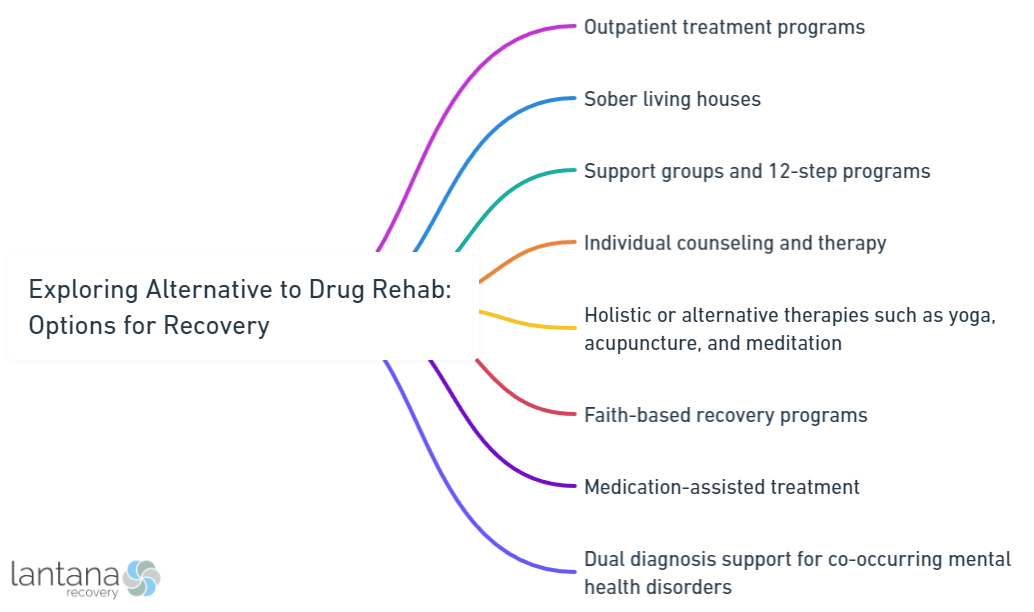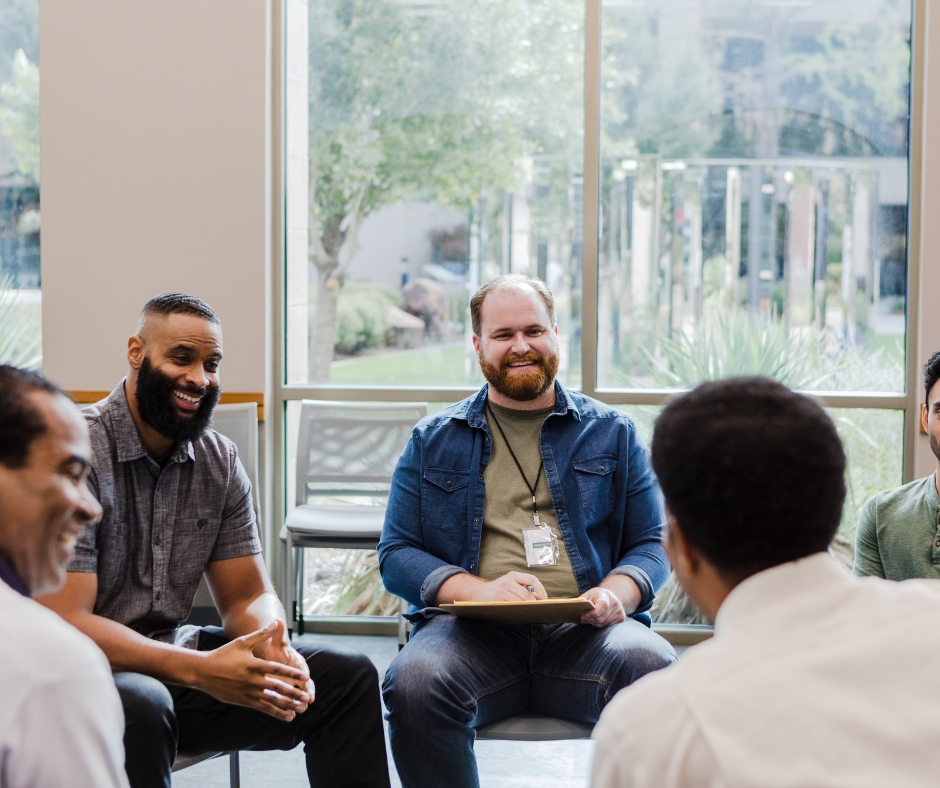Are you or someone you love seeking addiction treatment but traditional drug rehab doesn’t seem like the right fit? If you’re looking for a fresh perspective on addiction recovery, you’re in the right place. This blog post explores a variety of alternative addiction treatment options available in 2024, focusing on holistic approaches, outpatient programs, and non-12-step recovery models as an alternative to drug rehab. Let’s dive in and find the option that best suits your unique needs and preferences.
Short Summary
-
Explore alternative options for addiction recovery that focus on physical, mental and spiritual well-being.
-
Take advantage of supportive therapies such as mindfulness & meditation, yoga & movement therapy, nutritional therapy and more.
-
Find the right treatment option to best suit your individual needs for a successful journey towards sobriety.
Understanding the Need for Alternatives to Drug Rehab
Traditional drug rehab isn’t for everyone. Some individuals may have personal preferences, financial constraints, or a desire for a different treatment approach that better aligns with their beliefs and needs. In recent years, exciting alternative addiction treatment options have emerged, offering promising solutions in residential and ambulatory care settings to address drug addiction and drug abuse, such as therapeutic community and Minnesota Model, outpatient drug-free, and methadone maintenance approaches.
Exploring alternative treatments may enhance psychological health and well-being. It can also possibly improve the factors that can contribute to the success of treatment programs and enable relapses to be avoided. It’s crucial to find a place that truly resonates with an individual seeking addiction treatment, as this can powerfully boost and sustain motivation for recovery.

Holistic Approaches to Addiction Treatment
Holistic approaches to addiction treatment provide comprehensive healing by considering physical, mental, emotional, and spiritual aspects of well-being for a more sustainable recovery. These approaches can be applied in residential treatment settings and include a variety of therapies, such as Cognitive Behavioral Therapy, Motivational Interviewing, Biofeedback, Refuge Recovery, Art Therapy, Meditation, and HeartMath.
In the following subsections, we will explore some popular holistic methods: mindfulness and meditation, yoga and movement therapy, and nutritional therapy.

Mindfulness and Meditation
Mindfulness and meditation can play a significant role in addiction recovery by helping individuals become more aware of the present moment without judgment or interpretation. Many recent studies have proved the efficacy of mindfulness based relapse prevention therapies for substance abuse.
In 2014, Sarah Bowen from North Carolina State University explored the relative efficacy of mindfulness-based relapse prevention for substance use disorders in a randomized clinical trial. The study was published in Journal of the American Medical Association and reported a decline in drug use after 8 weeks of meditation in a trial of 286 participants.
This increased self-awareness, combined with reduced stress and improved coping skills, can greatly benefit those in inpatient treatment. Mindfulness training can empower individuals to better manage their emotions and stay in control of their reactions, which can be an essential part of specialized treatment for addiction recovery.
Some great mindfulness and meditation practices to try include mindful breathing, body scan meditation, yoga, and guided imagery. These practices can help individuals struggling with drug use relax and find inner peace, further enhancing their overall well-being and journey towards recovery.
Yoga and Movement Therapy

Yoga therapy is a powerful tool in addiction recovery, as it can help individuals achieve improved physical and mental health through tailored sessions conducted by trained yoga therapists. Practicing yoga can foster physical health, emotional balance, mental clarity, and even a spiritual connection or sense of interconnectedness. This can be especially helpful in addressing feelings of isolation and shame often associated with addiction.
Y12SR, or The Yoga of 12-Step Recovery, is an effective integration of yogic philosophy and the traditional 12-step model, helping individuals achieve a better life. Incorporating yoga and movement therapy into one’s recovery plan can pave the way for more balanced and successful addiction recovery.
Nutritional Therapy
Proper nutrition is essential for overall health and well-being during addiction recovery. Nutritional therapy can be a powerful tool in this process, focusing on proper diet and, in some cases, supplements tailored to individual needs. However, it’s important to remember that supplements are not regulated by the FDA, and some can be addictive themselves, so choose wisely.
Coenzyme NAD and amino acids are great supplements to consider for addiction recovery. Working with a functional medicine doctor or naturopath can help evaluate your current health and recommend appropriate supplements and dietary changes to support your recovery journey.
Outpatient Treatment Options

For those who cannot commit to residential treatment or prefer a more flexible approach to addiction recovery, various outpatient alcohol treatment options are available. These programs typically involve services such as counseling, therapy, education, and support groups that can help individuals on their journey to recovery.
If you need help deciding whether you should join a rehab or not, read our article about what is rehab like to gain a deeper understanding of how these treatment facilities operate and if you should join one.
In the following subsections, we’ll delve into Intensive Outpatient Programs (IOPs), telehealth and online therapy, and support groups and peer recovery programs.
Intensive Outpatient Programs (IOPs)
Intensive Outpatient Programs (IOPs) offer a higher level of care than standard outpatient treatment while allowing participants to maintain work and family commitments. IOPs provide comprehensive support to address addictions, depression, eating disorders, mental health issues, and other dependencies through group therapy. Generally, IOPs involve 6-30 hours of programming per week.
IOPs are designed to equip individuals with the necessary skills and strategies to stay sober and manage their mental health. Offering an elevated level of care and a nurturing environment, IOPs provide participants with the opportunity to benefit from each other and form a network of support.
Telehealth and Online Therapy
Telehealth and online therapy services offer great convenience and flexibility, enabling individuals to access mental health support from the comfort of their own homes. Services like TalkSpace and BetterHelp provide convenient and accessible online or app-based therapy services.
Telehealth and online therapy services, often supported by the mental health services administration, offer a convenient and accessible way to get the mental health support needed for addiction recovery. However, there are some drawbacks, such as the lack of in-person contact, the potential for misdiagnosis, and the lack of regulation in some countries.
Despite these challenges, telehealth and online therapy services can be a valuable resource for those seeking alternative addiction treatment options.
Support Groups and Peer Recovery Programs
Support groups and peer recovery programs play a vital role in providing social support, accountability, and encouragement during addiction recovery. These inspiring gatherings of individuals who share a common experience or challenge, such as addiction or mental illness, provide a safe and encouraging environment for members to share their stories, offer each other emotional support, and learn from one another.
“Active involvement in support groups significantly improves one’s chances of remaining clean and sober, regardless of the group in which one participates.” (Religiosity and participation in mutual-aid support groups for addiction, Atkins, Hawdon, 2007)
Peer recovery programs, led by individuals who have personal experience with addiction or mental illness and have triumphantly achieved recovery, provide support, guidance, and resources to individuals who are striving to overcome their own challenges and achieve long-term recovery through relapse prevention.
Participating in support groups and peer recovery programs can significantly enhance one’s addiction recovery journey, especially for those dealing with alcohol addiction.
Non-12-Step Recovery Models

For individuals who may not resonate with the spiritual aspect or structure of Alcoholics Anonymous (AA) and similar programs, there are alternative recovery models available. These models cater to various needs and preferences, offering a fresh take on addiction recovery.
In the following subsections, we will explore SMART Recovery, LifeRing Secular Recovery, and Moderation Management as inspiring alternatives to traditional 12-step programs.
SMART Recovery
SMART SMART. Recovery is a leading evidence-based addiction recovery program that stands for Self-Management and Recovery Training. This inspiring method focuses on transitioning from addictive substances and behaviors towards a life beyond addiction. SMART SMART! Recovery promotes self-empowerment for those struggling with addiction and addictive behaviors, providing a self-help support group for individuals striving to remain abstinent from drugs and alcohol and/or other problem behaviors.
The SMART Recovery Toolbox is packed with helpful methods, worksheets, and exercises to empower individuals to take control of their addiction recovery and their life. SMART! Recovery meetings are free, self-empowering mutual support group meetings focused on addictive behaviors, organized and facilitated by trained volunteers to help individuals reach their goals.
LifeRing Secular Recovery
LifeRing Secular Recovery offers a supportive, anonymous environment to assist individuals in their journey to addiction recovery through abstinence-based methods. LifeRing meetings, facilitated by a “convener,” encourage productive conversation to help participants make the most of their time and focus on the present, empowering them to leave the past behind.
LifeRing Secular Recovery emphasizes individual growth and self-determination in the recovery process without any religious or spiritual component. This approach empowers individuals to take control of their journey to recovery, offering a secure and encouraging atmosphere to share their battles with addiction and gain support from peers.
Moderation Management
Moderation Management (MM) is a program designed to help individuals address problem drinking before it becomes a major issue. MM encourages individuals to develop healthier drinking habits and transform risky drinking habits and problematic behaviors, not necessarily complete abstinence.
The 7 steps of Moderation Management are designed to help individuals recognize harmful drinking patterns and address problem drinking. Participants are urged to take part in the fifth step, which calls for them to stay sober for a period of one month. This is an important milestone in the process of achieving complete sobriety. If they can drink responsibly and in moderation after that, then that’s great. If not, they can keep participating in the MM program. Alternatively, they may join an abstinence-only type group.
Moderation Management offers a harm reduction approach to addiction recovery, allowing individuals to develop healthier habits and take responsibility for their actions.
Dual Diagnosis Treatment

For individuals with co-occurring mental health and substance use disorders, specialized treatment is essential. Dual diagnosis treatment provides integrated care that can address both conditions at once, including substance abuse, ensuring that individuals receive the comprehensive support they need for successful recovery.
When choosing the right addiction treatment program, it’s essential to consider factors such as gender, racial group membership, functional characteristics, patient’s participation, educational level, and socioeconomic status. Services like social services, vocational training, education, legal assistance, financial assistance, counseling, health and dental care, and mental health treatment can all contribute to a successful treatment plan.
By addressing both mental health and substance use disorders simultaneously, dual diagnosis treatment can significantly improve long-term recovery outcomes, suggests Xie et al., in their study, Three-year recovery outcomes for long-term patients with co-occurring schizophrenic and substance use disorders, published in Schizophrenia Research, 2005.
Finding the Right Alternative Treatment Option

As you explore the various alternative addiction treatment options presented in this blog post, it’s essential to take into account your individual needs, preferences, and circumstances. Consider factors such as lifestyle, budget, location, and the type of treatment when researching and selecting the most suitable option for you.
Remember, finding the right alternative treatment option is a crucial step in your journey towards addiction recovery. By taking the time to research and select the option that best resonates with your needs and preferences, you’ll be better equipped to achieve long-term recovery and a healthier, happier life.
And if you need help figuring out the right course of treatment for you, we encourage you to visit us at our drug rehab in Charleston.
Summary
In conclusion, there are numerous alternative addiction treatment options available in 2024 for those seeking a fresh perspective on recovery. From holistic approaches and outpatient programs to non-12-step recovery models and dual diagnosis treatment, it’s crucial to explore these options and find the one that resonates most with your individual needs, preferences, and circumstances. By taking the time to research and select the right alternative treatment option, you’ll be well on your way to a brighter, healthier future free from addiction.
Frequently Asked Questions
What is the most successful treatment for addiction?
Medication combined with cognitive behavior therapy, contingency management, 12-step facilitation, treatment with medication, and self help groups are proven to be the most successful treatments for addiction.
What are some alternative addiction treatments to traditional drug rehab?
Alternative addiction treatments like holistic approaches, outpatient programs, and dual diagnosis treatment offer an alternative to traditional drug rehab for those struggling with addiction.
These alternatives to long term rehab focus on the underlying causes of addiction, such as mental health issues, trauma, and stress, and provide a more comprehensive approach to recovery. They also provide more flexibility and support for those who may not be able to.
How can holistic approaches to addiction treatment help in recovery?
Holistic approaches to addiction treatment provide a more holistic approach to recovery by taking into consideration physical, mental, emotional, and spiritual aspects of well-being, creating more sustainable results.
This approach looks at the whole person, rather than just the addiction, and helps to create a more comprehensive plan for recovery. It also allows for more individualized treatment plans, as each person’s needs are taken into account. This can lead to better outcomes and a better outcome.
What are the advantages of Intensive Outpatient Programs (IOPs)?
IOPs offer a great balance between high-level care and convenience, making them ideal for individuals looking to manage both their health and their other commitments. They provide an optimal level of care while allowing participants to stay connected to their community and maintain their daily responsibilities.
What factors should be considered when researching and selecting an alternative addiction treatment option?
When researching alternative addiction treatment options, it’s important to take into account factors such as lifestyle, budget, location, and the type of treatment to find the best fit for your needs.
These factors can help you narrow down your choices and make an informed decision about the best treatment option for you. Consider the type of treatment you need, such as inpatient or outpatient, and the location of the facility. Additionally, think about your lifestyle and budget to determine your lifestyle.









